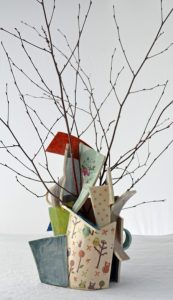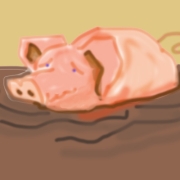Spring ceramics
This blog usually begins with a view from Bradlow Knoll looking down towards Ledbury, accompanied by text complaining about the effort required to get to the top. This time, for a change, behold the view looking up towards the Knoll – disappointingly, the hill does not look so challenging in the photo, but it is a slog. Honest.
This is meant to be a ceramics blog, but I sometimes find myself meandering away from the subject and end up finding out about things I had little or no idea about. Then I feel I have to share it all with you, dear reader. This time I delved into the world of rats because they are so evident outside and inside the house, but before I deal with them, if the following comes across as a Latin lesson, please forgive me:
Equinox, the time or date (twice each year) at which the sun crosses the equator, when day and night are of approximately equal length (22 September and 20 March). Either of the two occasions in the year when the centre of the sun is directly above the equator, and day and night are equal in length, thus “equi” (from Latin “aequuus”, meaning equal, and “nox” meaning night). In case you are asking, the solstice is the longest and shortest day of the year.
In the northern hemisphere, the vernal equinox marks the first day of spring and occurs when the sun moves north across the equator – “vernal” comes from the Latin word ver, meaning “spring.” Here endeth the lesson. Why am I telling you all this?
Because the Coastal Gallery in Lymington is collaborating with the Palais des Vaches in Exbury (Hampshire) and putting on a show of paintings, sculptures and ceramics to celebrate the Spring Equinox. The private view is on Friday 18th March, 5 – 8.30pm, and the exhibition continues Saturday 19th – Sunday 20th March, 11am – 4pm. Otherwise it is by appointment only.
The pieces commissioned are meant to reflect abundance, green shoots, and Spring in general (thus the images of bunnies, hedgehogs and birds in parts of the vases, don’t know what the teapot is doing there). Do have a look if you live nearby.
Ah, Spring. When air temperatures rise, life is primed and ready to go. Sap is rising, supplying the energy needed to grow new shoots and leaves. Animals become active — arising from winter sleep, migrating, breeding.
However, rats do not have a real breeding season. if they are all warm and tucked up in your cellar or attic, that is the perfect setting for continuous breeding. My research shows that a female rat can be ready to re-conceive immediately after giving birth. At home they can be seen running between the yew tree and the cellar, lurking behind raised beds and sometimes climbing up and having a go at the bird food. They can often be heard scratching behind the skirting boards in the sitting room. I say “they” now, because in my naivety I first thought it was just one rat called Eric.
I have an air rifle and I admit I took a shot at Eric, and thought I’d got him, but he soon reappeared, mocking me with his tubby gait and air of nonchalance. Shocked that I could even think of taking a life, even a rat’s, my colleague, the poet Brenda Read-Brown, wrote a poem, as a result of which I have pledged not to shoot Eric:
Making a living (by Brenda Read-Brown)
The shotgun’s missing from its mount.
It’s by his side, he says, ready
to kill the rat. It’s a big one, he says.
And in the basement, a sleek intelligence
plans a raid, sets the alarm
for its nightshift, behaves
like early man, who had to hunt
to live; does what it can
to keep its fur from red spatter,
its guts intact and full,
its family fed.
It only wants the things that matter:
cast-off crumbs of bread;
a roof over its head.
It’s willing to work, to creep,
to hide and run.
The man leaves his post today;
buys his food, takes his car through a wash
crewed by thin-faced strangers
who won’t meet his gaze;
men willing to work, to beg,
to hide and run.
Men who know the meaning
of a gun.
And now a complete change of subject. Scribble is an online venue for flash (very short) and short fiction. This eclectic journal is open to literary fiction and all fiction genres with a literary approach, and has published a short story called Last Outing by yours truly – if you’d like to read it, click here. It’s about an old aunt being taken out for lunch.
Any further developments regarding Eric will be reported. For now, he is just a fortunate rodent unaware of the power of poetry to change lives, even small furry ones.





















Judging by his grin, I think Eric has been helping himself to your wine!